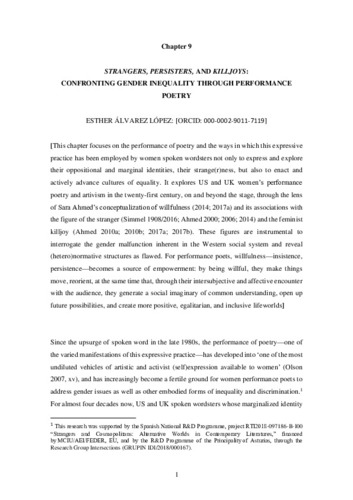Strangers, Persisters, and Killjoys. Confronting Gender Inequality through Performance Poetry
Autor(es) y otros:
Editor/Coord./Trad.:
Palabra(s) clave:
performance poetry; willfulness; stranger; utopian performative; sexism
Fecha de publicación:
Editorial:
Routledge
Citación:
Resumen:
This chapter focuses on the performance of poetry and the ways in which this expressive practice has been employed by women spoken wordsters not only to express and explore their oppositional and marginal identities, their strange(r)ness, but also to enact and actively advance cultures of equality. It explores US and UK women’s performance poetry and artivism in the twenty-first century, on and beyond the stage, through the lens of Sara Ahmed’s conceptualization of willfulness (2014; 2017a) and its associations with the figure of the stranger (Simmel 1908/2016; Ahmed 2000; 2006; 2014) and the feminist killjoy (Ahmed 2010a; 2010b; 2017a; 2017b). These figures are instrumental to interrogate the gender malfunction inherent in the Western social system and reveal (hetero)normative structures as flawed. For performance poets, willfulness—insistence, persistence—becomes a source of empowerment: by being willful, they make things move, reorient, at the same time that, through their intersubjective and affective encounter with the audience, they generate a social imaginary of common understanding, open up future possibilities, and create more positive, egalitarian, and inclusive lifeworlds
This chapter focuses on the performance of poetry and the ways in which this expressive practice has been employed by women spoken wordsters not only to express and explore their oppositional and marginal identities, their strange(r)ness, but also to enact and actively advance cultures of equality. It explores US and UK women’s performance poetry and artivism in the twenty-first century, on and beyond the stage, through the lens of Sara Ahmed’s conceptualization of willfulness (2014; 2017a) and its associations with the figure of the stranger (Simmel 1908/2016; Ahmed 2000; 2006; 2014) and the feminist killjoy (Ahmed 2010a; 2010b; 2017a; 2017b). These figures are instrumental to interrogate the gender malfunction inherent in the Western social system and reveal (hetero)normative structures as flawed. For performance poets, willfulness—insistence, persistence—becomes a source of empowerment: by being willful, they make things move, reorient, at the same time that, through their intersubjective and affective encounter with the audience, they generate a social imaginary of common understanding, open up future possibilities, and create more positive, egalitarian, and inclusive lifeworlds
Colecciones
Ficheros en el ítem





